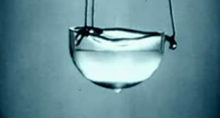
Back هيليوم سائل Arabic तरल हीलियम Bihari তরল হিলিয়াম Bengali/Bangla Heli líquid Catalan Kapalné helium Czech Flydende helium Danish Helio líquido Spanish هلیوم مایع Persian Hélium liquide French הליום נוזלי HE
 Liquid helium in a transparent bowl, cooled below the Lambda point, where it exhibits properties of superfluidity
| |
| Properties | |
|---|---|
| He | |
| Molar mass | 4.002602 g·mol−1 |
Except where otherwise noted, data are given for materials in their standard state (at 25 °C [77 °F], 100 kPa).
| |
Liquid helium is a physical state of helium at very low temperatures at standard atmospheric pressures. Liquid helium may show superfluidity.
At standard pressure, the chemical element helium exists in a liquid form only at the extremely low temperature of −269 °C (−452.20 °F; 4.15 K). Its boiling point and critical point depend on which isotope of helium is present: the common isotope helium-4 or the rare isotope helium-3. These are the only two stable isotopes of helium. See the table below for the values of these physical quantities. The density of liquid helium-4 at its boiling point and a pressure of one atmosphere (101.3 kilopascals) is about 125 g/L (0.125 g/ml), or about one-eighth the density of liquid water.[1]